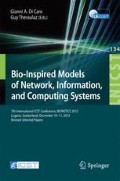Abstract
A problem in the phenomenological reconstruction of Complex Systems (CS) is the extraction of the knowledge that elements playing in CS use during its evolution. This problem is important because such a knowledge would allow the researcher to understand the global behavior of the system [1, 2]. In this paper an approach to partially solve this problem by means of Formal Concept Analysis (FCA) is described in a particular case, namely Language Dynamics. The main idea lies in the fact that global knowledge in CS is naturally built by local interactions among agents, and FCA could be useful to represent their own knowledge. In this way it is possible to represent the effect of interactions on individual knowledge as well as the dynamics of global knowledge. Experiments in order to show this approach are given using WordNet.
Partially supported by TIN2009-09492 project (Spanish Ministry of Science and Innovation) and Proyecto de excelencia TIC-6064 of Junta de Andalucía, cofinanced with FEDER founds.
Access this chapter
Tax calculation will be finalised at checkout
Purchases are for personal use only
Notes
- 1.
- 2.
- 3.
Some of them will be weakened in future works.
References
Aranda-Corral, G.A., Borrego-Díaz, J., Galán-Páez, J.: Scale-free structure in concept lattices associated to complex systems. In: Proceedings of International Conference on Complex Systems, ICCS 2012 (2012) (to appear in IEEE press)
Aranda-Corral, G.A., Borrego-Díaz, J., Galán-Páez, J.: Complex concept lattices for simulating human prediction in sport. J. Syst. Sci. Complex. 26(1), 117–136 (2013). (to appear)
Balcázar, J.L.: Redundancy, deduction schemes, and minimum-size bases for association rules. Log. Meth. Comput. Sci. 6(2), 1–23 (2010)
Belohlavek, R., Macko, J.: Selecting important concepts using weights. In: Jäschke, R. (ed.) ICFCA 2011. LNCS (LNAI), vol. 6628, pp. 65–80. Springer, Heidelberg (2011)
Bertet, K., Monjardet, B.: The multiple facets of the canonical direct unit implicational basis. Theor. Comput. Sci. 411(22–24), 2155–2166 (2010)
Ganter, B., Wille, R.: Formal Concept Analysis - Mathematical Foundations. Springer, Berlin (1999)
Gong, T., Wang, W.S.-Y.: Computational modeling on language emergence: a coevolution model of lexicon, syntax and social structure. Lang. Linguist. 6, 1–42 (2005)
Guigues, J.-L., Duquenne, V.: Familles minimales d’implications informatives resultant d’un tableau de donnees binaires. Math. Sci. Hum. 95, 5–18 (1986)
Ke, J., Holland, J.H.: Language origin from an emergentist perspective. Appl. Linguist. 27(4), 691–716 (2006)
Kirby, S.: Syntax without Natural Selection: How compositionality emerges from vocabulary in a population of learners. In: Knight, C. (ed.) The Evolutionary Emergence of Language: Social Function and the Origins of Linguistic Form, pp. 303–323. Cambridge University Press, Cambridge (2000)
Loreto, V., Baronchelli, A., Mukherjee, A., Puglisi, A., Tria, F.: Statistical physics of language dynamics. J. Stat. Mech. Theory Exp. 4, 1–29 (2011)
Luxemburger, M.: Implications partielles dans un contexte. Math. Inf. Sci. Hum. 113, 35–55 (1991)
Patriarca, M., Castelló, X., Uriarte, J.R., Eguiluz, V.M., San, M.: Miguel, modelling two-language competition dynamics. Adv. Complex Syst. 15(3–4), 1–24 (2012)
Mukherjee, A., Tria, F., Baronchelli, A., Puglisi, A., Loreto, V.: Aging in language dynamics. PLoS ONE 6(2), e16677 (2011). doi:10.1371/journal.pone.0016677
Priss, U., Old, L.J.: Data weeding techniques applied to roget’s thesaurus. In: Wolff, K.E., Palchunov, D.E., Zagoruiko, N.G., Andelfinger, U. (eds.) KONT 2007 and KPP 2007. LNCS (LNAI), vol. 6581, pp. 150–163. Springer, Heidelberg (2011)
Priss, U., Old, L.J.: Concept neighbourhoods in lexical databases. In: Kwuida, L., Sertkaya, B. (eds.) ICFCA 2010. LNCS (LNAI), vol. 5986, pp. 283–295. Springer, Heidelberg (2010)
Rudolph, S., Völker, J., Hitzler, P.: Supporting lexical ontology learning by relational exploration. In: Priss, U., Polovina, S., Hill, R. (eds.) ICCS 2007. LNCS (LNAI), vol. 4604, pp. 488–491. Springer, Heidelberg (2007)
Steels, L., McIntyre, A.: Spatially distributed naming games. Adv. Complex Syst. 1(4), 301–323 (1999)
Steels, L.: A self-organizing spatial vocabulary. Artif. Life 2(3), 319–332 (1995)
Steels, L.: Self-organizing vocabularies. In: Artificial Life V: Proceedings of 5th International Workshop on the Synthesis and Simulation of Living Systems, pp. 179–84. MIT Press (1996)
Yevtushenko, S.A.: System of data analysis “Concept Explorer”. In: Proceedings of 7th National Conference on Artificial Intelligence KII-2000, pp. 127–134 (2000)
Author information
Authors and Affiliations
Corresponding author
Editor information
Editors and Affiliations
Rights and permissions
Copyright information
© 2014 Institute for Computer Sciences, Social Informatics and Telecommunications Engineering
About this paper
Cite this paper
Aranda-Corral, G.A., Borrego-Díaz, J., Galán-Páez, J. (2014). Simulating Language Dynamics by Means of Concept Reasoning. In: Di Caro, G., Theraulaz, G. (eds) Bio-Inspired Models of Network, Information, and Computing Systems. BIONETICS 2012. Lecture Notes of the Institute for Computer Sciences, Social Informatics and Telecommunications Engineering, vol 134. Springer, Cham. https://doi.org/10.1007/978-3-319-06944-9_21
Download citation
DOI: https://doi.org/10.1007/978-3-319-06944-9_21
Published:
Publisher Name: Springer, Cham
Print ISBN: 978-3-319-06943-2
Online ISBN: 978-3-319-06944-9
eBook Packages: Computer ScienceComputer Science (R0)

